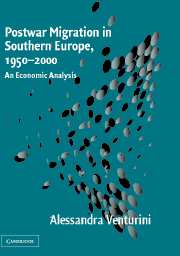Book contents
- Frontmatter
- Contents
- List of Figures and Tables
- Acknowledgments
- Introduction
- 1 The Evolution of Migration in Southern European Countries
- 2 The Choice to Migrate
- 3 The Effects of Immigration on the Receiving Country
- 4 The Effects of Emigration on the Country of Origin
- 5 The Effectiveness of Migration Policies
- References
- Index
5 - The Effectiveness of Migration Policies
Published online by Cambridge University Press: 25 June 2009
- Frontmatter
- Contents
- List of Figures and Tables
- Acknowledgments
- Introduction
- 1 The Evolution of Migration in Southern European Countries
- 2 The Choice to Migrate
- 3 The Effects of Immigration on the Receiving Country
- 4 The Effects of Emigration on the Country of Origin
- 5 The Effectiveness of Migration Policies
- References
- Index
Summary
This chapter focuses attention on how receiving countries can handle the problem of immigration by passing suitable legislation. Immigration is a complex phenomenon because it affects a number of core issues, such as national identity, sovereignty, and so on. It also has demographic, economic, and social effects. The receiving country will therefore want to control the flow of immigrants according to its political, social, and economic priorities. It is perfectly right that a country should do this, as recognized in the 1977 Helsinki agreement, which states that the “right to emigrate” is not matched by a symmetric “right to immigrate.” Immigration – that is, accepting an immigrant – is left to the “mercy of the nation state” (Garson 1997), and the policies adopted by each state should be considered in this light. The multiplicity of the consequences of immigration forces “immigration policy, in its strictest sense” – that is, the laws that regulate entry into and residence in a country and an immigrant's assimilation or eventual deportation – to be supplemented by norms that define who is considered to be an alien.
The widespread dissatisfaction with immigration policies is due in part to the numerous aspects that are involved. They range from the difficulty of anticipating changes in flows to the need to solve the conflicts that can arise. This may mean adopting measures that go against the basic principles of a modern democracy or that are extremely expensive.
- Type
- Chapter
- Information
- Postwar Migration in Southern Europe, 1950–2000An Economic Analysis, pp. 204 - 240Publisher: Cambridge University PressPrint publication year: 2004



